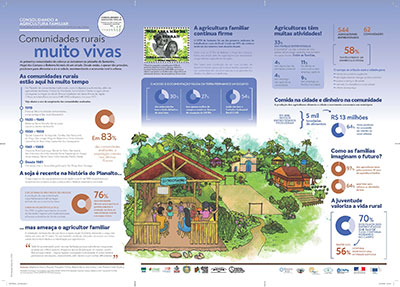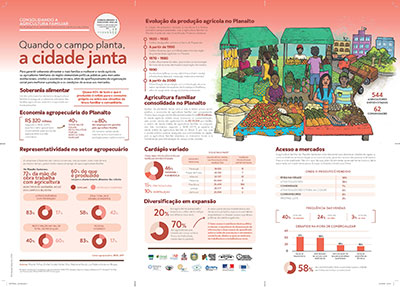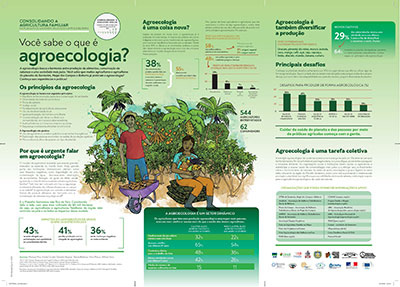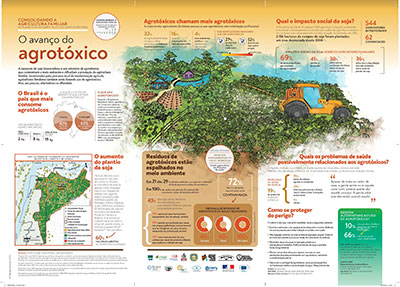© Vincent Bonnal
Consolidation of family farming on the Santarem Plateau
Family farming is of fundamental importance to a large share of the people living in Amazonia. It assures food security and nutritional security for the urban areas and provides income and jobs for many families.
Over the last three decades, the Brazilian government has, on many levels, adopted policies to subsidize and foment agribusiness in order to increase agricultural exports and reach primary surplus targets in the trade balance. The result: land area planted with soybean grew from 5.1 million hectares to 34.8 million hectares between 1974 and 2018. In 1997 there were 575 hectares of soybean farms in the state of Pará. In 2018, that number had multiplied nearly 1,000 times to 557,500 hectares. Soybean has become the largest crop in Northern Brazil. Meanwhile, family farming has continued to be addressed only within the sphere of social policy, which does not take into account its economic potential.
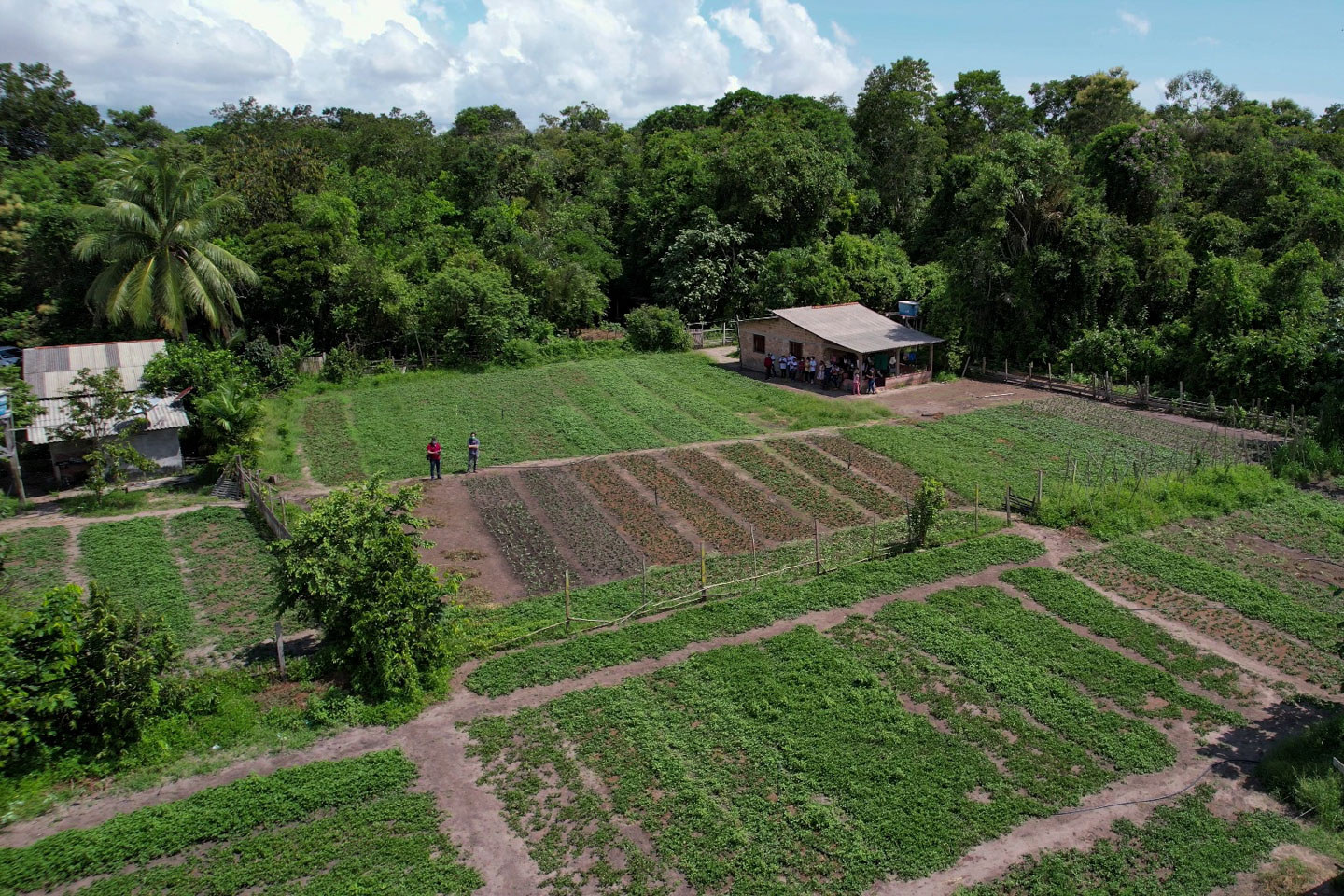
© Vincent Bonnal
Along with the soybean farms came highways, railways, ports and grain terminals. Soybean also brought deforestation, the concentration of properties, land conflicts and heavy pressure on rural communities which for hundreds of years had practiced family fishing and farming.
The Santarem Plateau in western Pará State, is one of the regions that has undergone this transformation. Its elevated topography and clayey soil make it fertile ground for agribusiness. Here, multinational giant Cargill has built a large grain port, which leveraged an 80,000-hectare swath of the monoculture in the region.
THE TERRITORY
The spread of soybean on the Santarem Plateau brought about an unbalanced conflict between agribusiness and family farms, which led to a disintegrative process in family farming. In debates, three important questions addressing the situation arose: land insecurity, pesticide poisoning and agroecology. In parallel, family farmers have developed ways to resist and innovate that guaranteed growing enterprise in certain areas of the Santarem Plateau. One example is increased production of fruits and vegetables, due to the fact that family farming continues to supply food to nearby urban populations. Still, these initiatives had not gained much attention.
The researchers from the Odisseia network selected three municipalities on the Santarem Plateau as territory for a Territorial Accompaniment project seeking to collect detailed data on the state of family farming, to train young community leaders to co-build visions of the future that would allow for consolidation of family farming on the Plateau.
ACTIONS
Through a partnership with the unions in Santarém, Mojuí dos Campos and Belterra, the Odisseia researchers promoted a series of initiatives together with community leaders in the Santarem Plateau:
2016
— The local community’s expectations are mapped out
2017
— A workshop is held to discuss the changes affecting the territory
— Local associations are organized and prepared for action
— A formal commitment with community leaders is made
2018
— The study’s main axes are constructed in a participative situation
— The conceptual model is detailed
— Group planning of the study’s method and focus
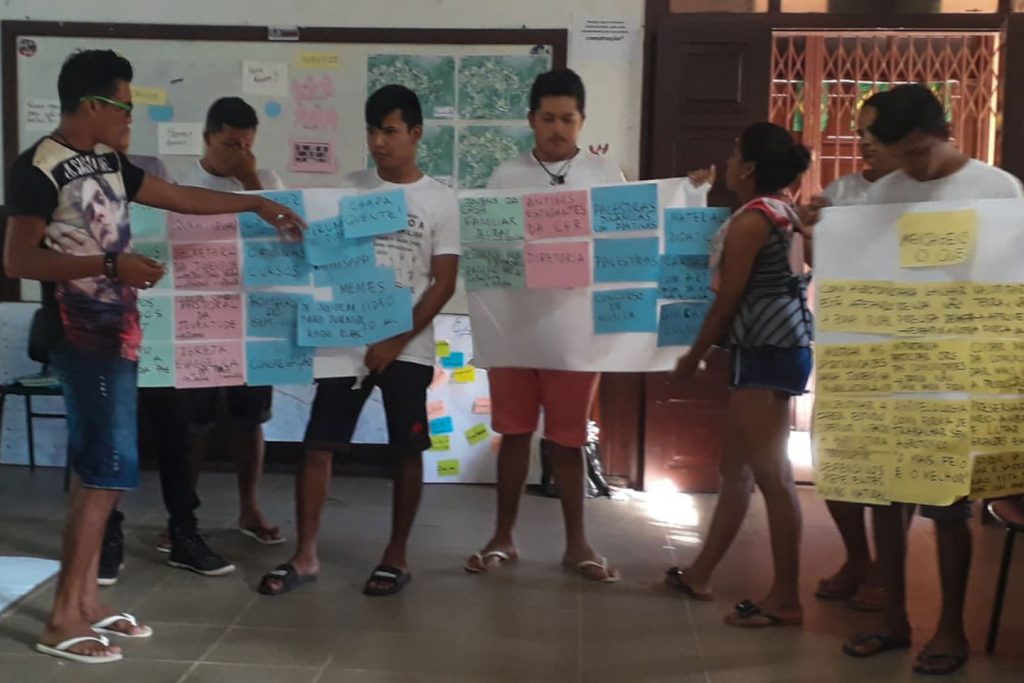
© Emilie Coudel
2019
— Participative zoning of the Plateau
— Training of community researchers
— Surveys are carried out by community researchers
— The first data from interviews are explored by the group
— The analyses are consolidated and conversations held on uses for the data
2020
— Results are shared and debated with many institutions inside the territory
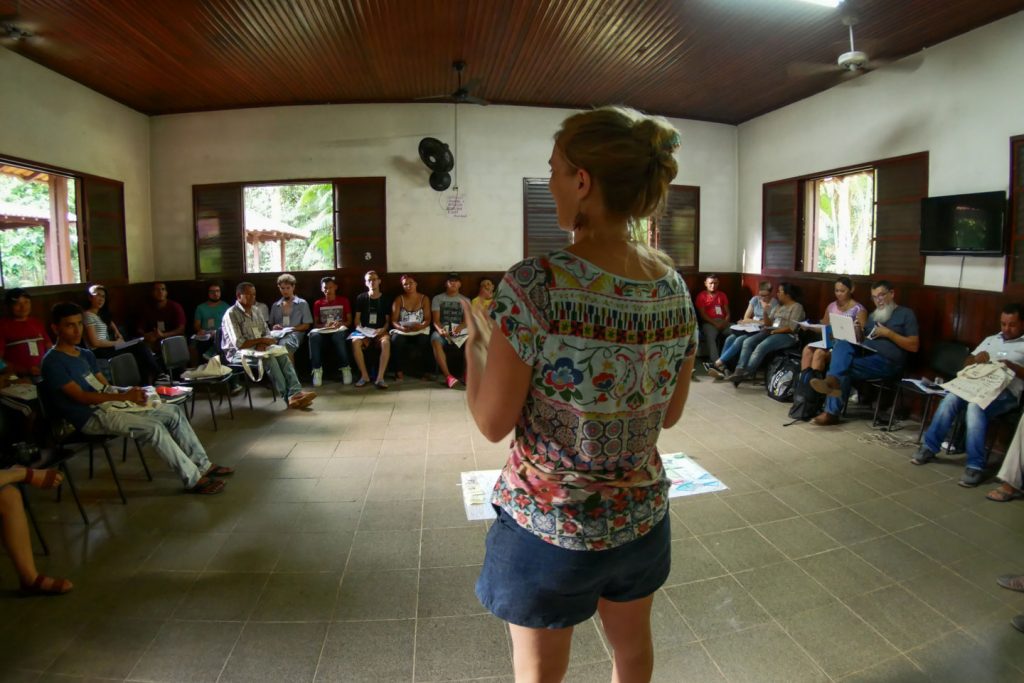
© Rodrigo Viellas
2021
— Strategies of action are consolidated to strengthen family farming
HIGHLIGHTS
Zones identified: predominantly agribusiness, family farms interspersed with agribusiness, family farming zones under pressure from the advance of agribusiness, zones where family farming is established, zones mostly of cattle raising, zones with family farming activities not related to agribusiness
Surveys carried out by community researchers: 18 young community researchers visited 62 communities, interviewing 544 farming families.
THE RESULTS
The Territorial Accompaniment process on the Santarem Plateau resulted in training of community leaders, gathering of objective data on defined priority topics and the production of knowledge that was shared between all project participants.
The results are expected, when used by community leaders, to offer bases for defining strategies and in negotiations with policy makers because the data have shown that family farming holds great economic importance, creates jobs and produces healthy food.
The data gathered in interviews with 544 families show that, even though it is under pressure from agribusiness, family farming is alive and well and can be an important source of income and of healthy products for nearby cities. Just on the farms of the families interviewed, 5,000 tons of food were produced in 2018, at a market value of R$ 13 million at the time. The most common products are cassava, fruits and vegetables.
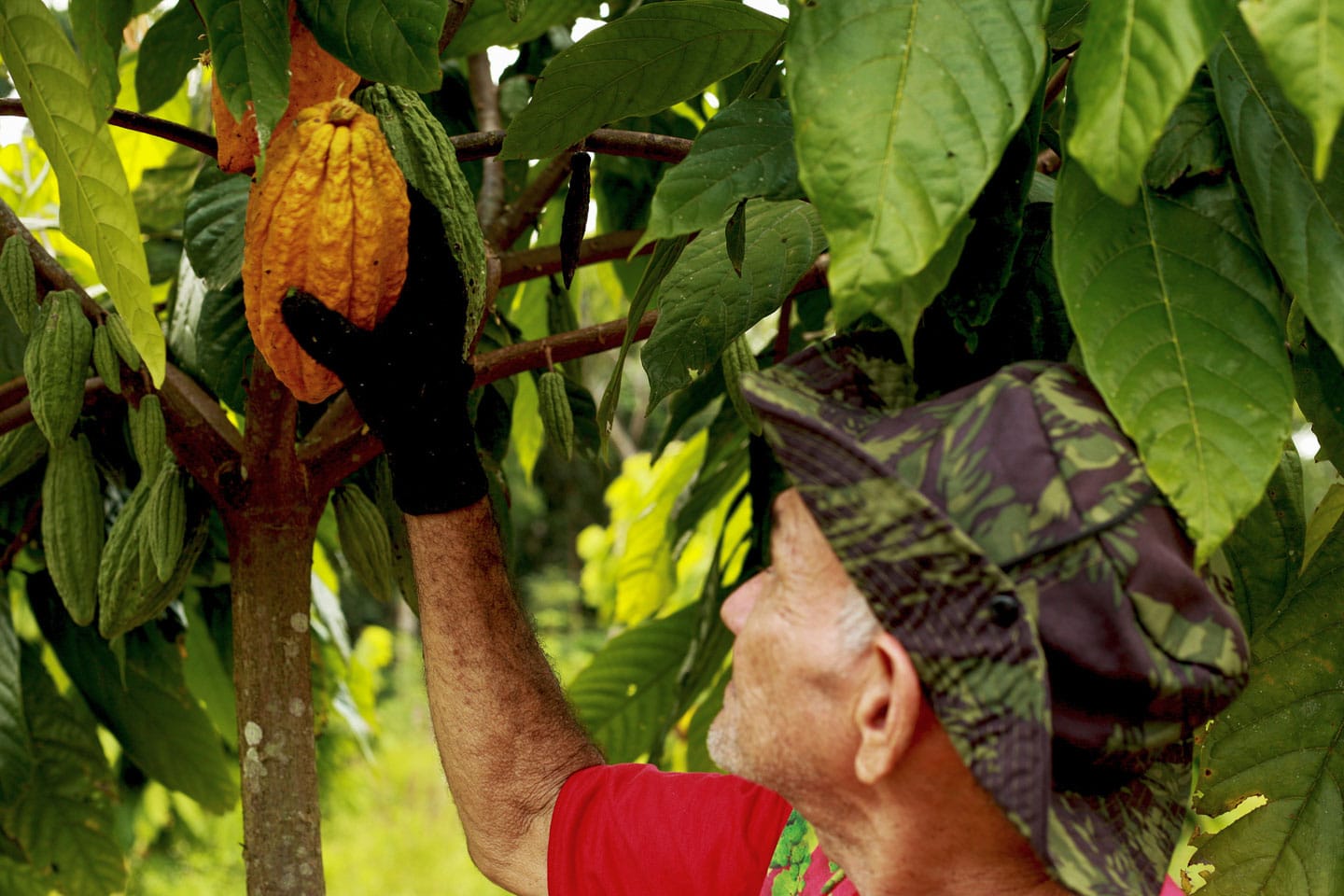
© Claudio Chena
Also according to the study, family farming’s main obstacles are: financial resources (46%), drought (41%), pests (39%) and the lack of technical assistance (35%).
The main challenges in selling the products grown on family farms are related to logistics. These data are important because they indicate actions and strategies that could be taken to consolidate family farming.
According to the study, agroecology is spreading and is a good alternative for family farms. Of those interviewed, 38% had already heard of agroecology. Of these, 50% use the practices.
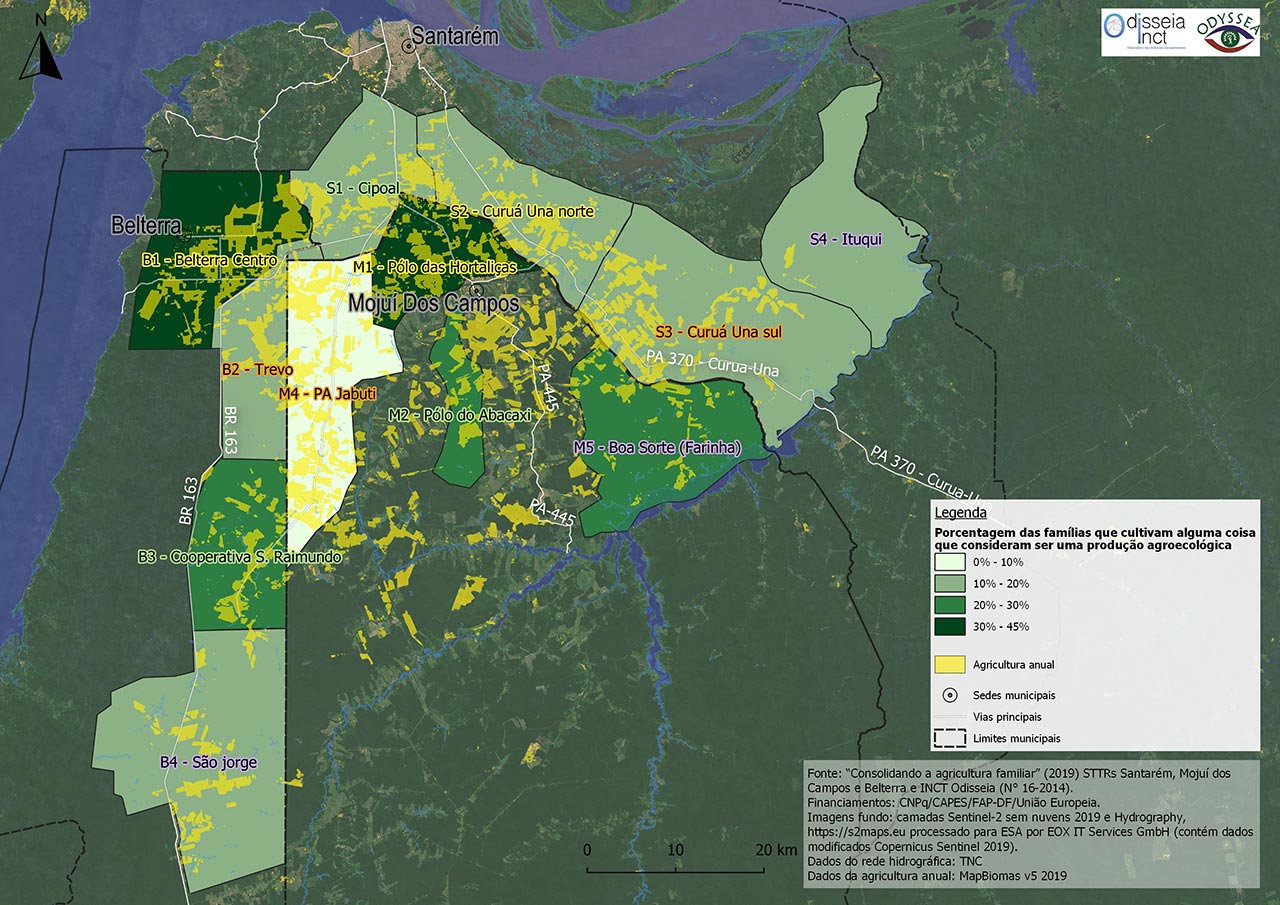
Aside from the land issue, the advance of soybean farming has brought many other impacts seen as negative by small farmers. Of those questioned, 81% affirmed that soybean monoculture brought no benefit to the communities and 69% said that it caused damage such as: loss of production (41%), climate change (37%) and general harm to the environment (35%).
Pesticide crop dusting is one of the main culprits according to the family farmers, causing health problems, degrading the environment and causing lost production. Small farmers say that the closer they are to monoculture farming, the more they are affected. On average, 43% say they have become sick (72%), had pest invasions (72%) and dried-out crops (40%). Of the smallholders located withing five kilometers of soybean fields, 40% told of losing production.
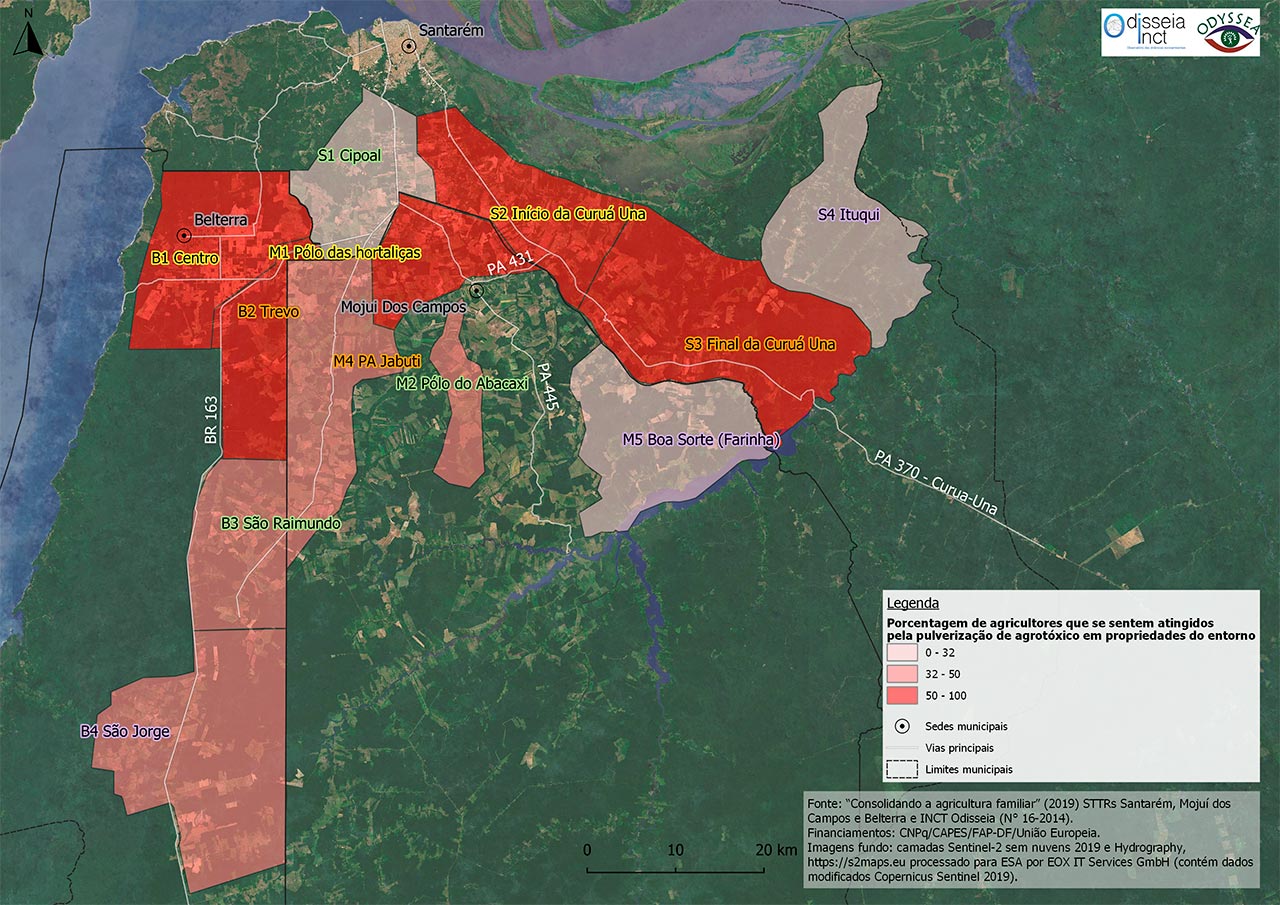
The main results were shared in an online event that brought together community leaders, agriculture extension agents, researchers from other institutions and policy makers. Then, in August, 2021, the Public Prosecutor’s Office and trade associations organized a session to understand and discuss the results in the Forum to Fight Against Pesticide Impacts. That event included formation of work groups to define concrete actions and carry them out.
CARTILHAS
PROJECTS UNDERTAKEN
-
- Odyssea (2016-2019), financed by the European Union (called H2020-RISE): link to the project website: https://www.odyssea-amazonia.org/
- INCT Odisseia (2017-2023), inanced by CNPQ, CAPES and FAP-DF (part of National Science and Technology Institutes’ call for proposals), link to the Project website: http://inct-odisseia.i3gs.org/
PARTNER INSTITUTIONS

FINANCING

PUBLICATIONS
Cortes João Paulo Soares, Coudel Emilie, Piraux Marc, Piva da Silva Mariana, Abreu dos Santos Beatriz, Folhes Ricardo and Gomes Pereira da Silva Romero, 2020, Quais as perspectivas da agricultura familiar em um contexto de expansão do agronegócio? Zoneamento participativo com representantes comunitários do Planalto Santareno [What are the perspectives for Family farming in a scenario of expanding agribusiness? Participative zoning with Community representatives from the Santarem Plateau], Confins [Online], 45. Available at: http://journals.openedition.org/confins/28077.
Abreu B, Coudel E, Nasuti S, R F, Matos Santos ME, Lima A v. 2021. Resistência à expansão da soja: aliança entre movimento social e cientistas [Resistence to the advance of soybean farming: an alliance between social movement and scientists]. Le Monde Diplomatique, Resistência América Latina. https://diplomatique.org.br/resistencia-expansao-da-soja-alianca-entre-movimento-social-e-cientistas/
Coudel Emilie, Nasuti Stéphanie, Abreu dos Santos Beatriz, Piva Mariana, Fechine Valéria, Folhes Ricardo, Co-producing knowledge with family farming organizations on changes impacting communities and households: a citizen science observatory in Santarém, Brazilian Amazon, Cahiers Agricultures, n°31, 14 p.
Coudel Emilie, Nasuti Stéphanie, Wagner Silva Danielle, Bonnet Marie-Paule, Piva Mariana, Abreu dos Santos Beatriz, Folhes Ricardo, Bonnal Vincent, Fechine Valéria, Lima Denise, Sousa Passos Carlos José, Schwamborn Txai Mitt, Nakamura Ione, Rodrigues de Moura Gracivane, 2021, « Rendre visible les impacts des pesticides du soja : contributions et limites d’un observatoire de science citoyenne à Santarém, Amazonie brésilienne », VertigO – la revue électronique en sciences de l’environnement [En ligne], Volume 21 numéro 3. URL : http://journals.openedition.org/vertigo/33716 ; DOI : https://doi.org/10.4000/vertigo.33716
Coudel, Emilie; Nasuti, Stéphanie; Fechine, Valéria; Piva, Mariana; Abreu, Beatriz; Folhes, Ricardo, 2021, “Family farming in Santarém region, Brazilian Amazon: survey with households (Odyssea project, 2019)”, https://doi.org/10.18167/DVN1/Y9WMSU, CIRAD Dataverse, V1
Nasuti, Stéphanie; Coudel, Emilie; Fechine, Valéria; Piva, Mariana; Abreu, Beatriz; Folhes, Ricardo, 2021, “Family farming in Santarém region, Brazilian Amazon: survey with rural community representatives (Odyssea project, 2019)”, https://doi.org/10.18167/DVN1/8R3OT1, CIRAD Dataverse, V1
Soares de Cortes, João Paulo; Coudel, Émilie; Piraux, Marc; Piva da Silva, Mariana; Abreu dos Santos, Beatriz; Folhes, Ricardo; Nasuti, Stéphanie; Gomes Pereira da Silva, Romero; Bonnal, Vincent, 2022, “Zoneamento participativo da agricultura familiar em um contexto de expansão do agronegócio com representantes comunitários do Planalto Santareno”, https://doi.org/10.18167/DVN1/ZKGA1I, CIRAD Dataverse, V1
French cooperation in Brazil
The partnership between Brazil and France focuses on sustainable development in Amazonia. CIRAD and the IRD work together with Brazilian scientific and agronomic communities such as EMBRAPA, Universities and Research and
Development Agencies.




